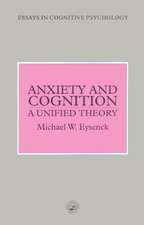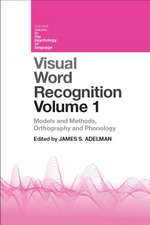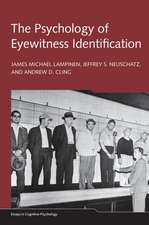Anxiety: The Cognitive Perspective: Essays in Cognitive Psychology
Autor Michael W. Eysencken Limba Engleză Paperback – 9 iun 2015
Another theme of this book is that it is of major importance to establish whether or not there is a cognitive vulnerability factor which is associated with at least some forms of clinical anxiety. It is argued (with supporting evidence) that there is a latent cognitive vulnerability factor for generalized anxiety disorder which manifests itself under stressful conditions. This vulnerability factor is characterized by hypervigilance, and is found predominantly in normals high in the personality dimension of trait anxiety.
The scope of the book extends to the effects of anxiety on performance and to the phenomenon of worry, which is regarded as the cognitive component of anxiety. In both cases, a new theoretical framework is presented.
Correction notice: In chapter 4, on pages 70-71, Christos Halkiopoulos should have been credited for his role as the inventor of the Dot Probe Paradigm and for the design and execution of the experiment discussed in Eysenck, M. W. (1991 a). Trait anxiety and cognition. In C. D. Spielberger, I. G. Sarason, Z. Kulczar, and J. Van Heck (Eds.), Stress and Emotion, Vol. 14. London: Hemisphere.
| Toate formatele și edițiile | Preț | Express |
|---|---|---|
| Paperback (1) | 483.49 lei 6-8 săpt. | |
| Taylor & Francis – 9 iun 2015 | 483.49 lei 6-8 săpt. | |
| Hardback (1) | 1325.92 lei 6-8 săpt. | |
| Lawrence Erlbaum Associates Inc – 25 iun 1992 | 1325.92 lei 6-8 săpt. |
Din seria Essays in Cognitive Psychology
-
 Preț: 386.42 lei
Preț: 386.42 lei - 13%
 Preț: 348.02 lei
Preț: 348.02 lei -
 Preț: 461.50 lei
Preț: 461.50 lei -
 Preț: 467.44 lei
Preț: 467.44 lei -
 Preț: 459.71 lei
Preț: 459.71 lei - 22%
 Preț: 369.82 lei
Preț: 369.82 lei -
 Preț: 410.88 lei
Preț: 410.88 lei - 15%
 Preț: 541.72 lei
Preț: 541.72 lei - 18%
 Preț: 998.88 lei
Preț: 998.88 lei - 13%
 Preț: 302.64 lei
Preț: 302.64 lei - 15%
 Preț: 423.28 lei
Preț: 423.28 lei -
 Preț: 482.53 lei
Preț: 482.53 lei -
 Preț: 480.62 lei
Preț: 480.62 lei -
 Preț: 482.94 lei
Preț: 482.94 lei - 48%
 Preț: 233.06 lei
Preț: 233.06 lei -
 Preț: 462.60 lei
Preț: 462.60 lei - 42%
 Preț: 233.06 lei
Preț: 233.06 lei - 18%
 Preț: 1000.27 lei
Preț: 1000.27 lei -
 Preț: 393.63 lei
Preț: 393.63 lei - 41%
 Preț: 236.05 lei
Preț: 236.05 lei -
 Preț: 482.35 lei
Preț: 482.35 lei - 26%
 Preț: 765.23 lei
Preț: 765.23 lei -
 Preț: 460.69 lei
Preț: 460.69 lei -
 Preț: 343.77 lei
Preț: 343.77 lei -
 Preț: 314.59 lei
Preț: 314.59 lei -
 Preț: 190.51 lei
Preț: 190.51 lei - 18%
 Preț: 1013.72 lei
Preț: 1013.72 lei - 17%
 Preț: 126.66 lei
Preț: 126.66 lei -
 Preț: 482.53 lei
Preț: 482.53 lei -
 Preț: 483.49 lei
Preț: 483.49 lei - 16%
 Preț: 130.21 lei
Preț: 130.21 lei -
 Preț: 465.39 lei
Preț: 465.39 lei - 31%
 Preț: 765.45 lei
Preț: 765.45 lei
Preț: 483.49 lei
Nou
Puncte Express: 725
Preț estimativ în valută:
92.51€ • 96.59$ • 76.57£
92.51€ • 96.59$ • 76.57£
Carte tipărită la comandă
Livrare economică 05-19 aprilie
Preluare comenzi: 021 569.72.76
Specificații
ISBN-13: 9781138876927
ISBN-10: 1138876925
Pagini: 208
Dimensiuni: 152 x 229 x 13 mm
Greutate: 0.32 kg
Ediția:1
Editura: Taylor & Francis
Colecția Psychology Press
Seria Essays in Cognitive Psychology
Locul publicării:Oxford, United Kingdom
ISBN-10: 1138876925
Pagini: 208
Dimensiuni: 152 x 229 x 13 mm
Greutate: 0.32 kg
Ediția:1
Editura: Taylor & Francis
Colecția Psychology Press
Seria Essays in Cognitive Psychology
Locul publicării:Oxford, United Kingdom
Public țintă
Postgraduate, Professional, and UndergraduateCuprins
Introduction. Theories of Anxiety and Cognition. Theoretical Framework. Attentional Processes. Comprehension and Memory. Worry. General Processing. Summary.
Recenzii
Despite having such a lengthy history to contend with, this book manages to break new ground in a number of directions...Eysenck explores the relationship between normal and clinical anxiety in considerable detail and rounds it off by presenting his own model of why some individuals are vulnerable to becoming clinically anxious...Emerging from an intelligent and considered review [of his research] is Eysenck's suggestion that some individuals are `hypervigilant to threat in their environment'. - Times Higher Education Supplement, 1993; Review by Tim Dalgleish
Descriere
The scope of the book extends to the effects of anxiety on performance and to the phenomenon of worry, which is regarded as the cognitive component of anxiety. In both cases, a new theoretical framework is presented.
Textul de pe ultima copertă
Theorists are increasingly arguing that it is fruitful to approach anxiety from the cognitive perspective, and the empirical evidence supports that contention. The cognitive perspective is also adopted in this book, but the approach represents a development and extension of earlier ones. For example, most previous theories and research have been based on anxiety either in clinical or in normal groups. In contrast, one of the central themes of this book is that there are great advantages to be gained from a joint consideration of clinical and normal anxiety.
Another theme of this book is that it is of major importance to establish whether or not there is a cognitive vulnerability factor which is associated with at least some forms of clinical anxiety. It is argued (with supporting evidence) that there is a latent cognitive vulnerability factor for generalized anxiety disorder which manifests itself under stressful conditions. This vulnerability factor is characterized by hypervigilance, and is found predominantly in normals high in the personality dimension of trait anxiety.
The scope of the book extends to the effects of anxiety on performance and to the phenomenon of worry, which is regarded as the cognitive component of anxiety. In both cases, a new theoretical framework is presented.
Another theme of this book is that it is of major importance to establish whether or not there is a cognitive vulnerability factor which is associated with at least some forms of clinical anxiety. It is argued (with supporting evidence) that there is a latent cognitive vulnerability factor for generalized anxiety disorder which manifests itself under stressful conditions. This vulnerability factor is characterized by hypervigilance, and is found predominantly in normals high in the personality dimension of trait anxiety.
The scope of the book extends to the effects of anxiety on performance and to the phenomenon of worry, which is regarded as the cognitive component of anxiety. In both cases, a new theoretical framework is presented.












